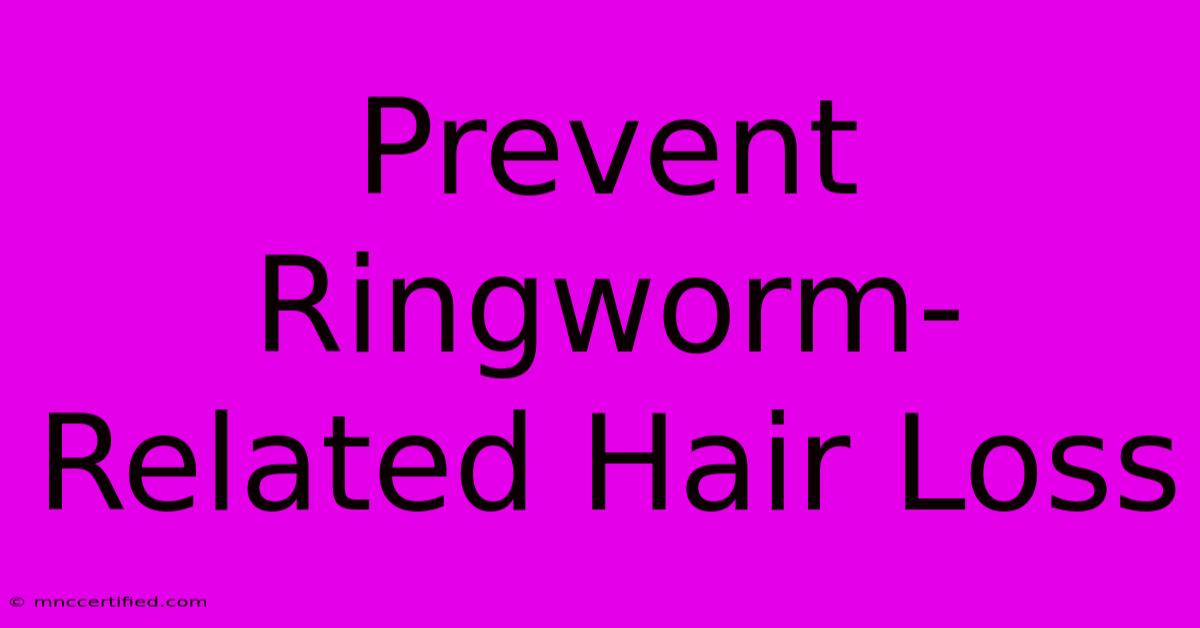Prevent Ringworm-Related Hair Loss

Table of Contents
Prevent Ringworm-Related Hair Loss: A Comprehensive Guide
Ringworm, despite its name, isn't caused by a worm but by a fungus. This fungal infection can affect the scalp, leading to a condition called tinea capitis, which, if left untreated, can cause significant hair loss. Understanding how to prevent ringworm and its associated hair loss is crucial for maintaining a healthy scalp and lustrous hair. This comprehensive guide will equip you with the knowledge and strategies to protect yourself and your loved ones.
Understanding Ringworm and Hair Loss
Tinea capitis, the scalp form of ringworm, presents with various symptoms, including:
- Scaly patches: These patches often appear red and inflamed.
- Hair loss: Affected areas may experience patchy hair loss, sometimes leaving bald spots.
- Itching: Intense itching is a common symptom.
- Pus-filled bumps: In some cases, small, pus-filled bumps can develop.
The fungus thrives in warm, moist environments, making it easily spread through direct contact (e.g., sharing combs, hats, or towels) or indirectly (e.g., contaminated surfaces). Children are particularly susceptible, and early intervention is key to preventing permanent hair loss.
Preventing Ringworm Infection: Proactive Measures
Preventing ringworm is far easier than treating it. Here’s how to minimize your risk:
1. Maintain Excellent Hygiene:
- Regular shampooing: Wash your hair regularly with a gentle, antifungal shampoo. This helps remove dead skin cells and other debris that the fungus thrives on.
- Clean combs and brushes: Regularly clean your hairbrushes and combs with warm, soapy water to eliminate any fungal spores.
- Keep your scalp dry: Avoid keeping your scalp excessively moist, especially after showering or swimming. Thoroughly dry your hair after washing.
- Avoid sharing personal items: Don't share hats, combs, brushes, towels, or other personal items that could harbor the fungus.
2. Boost Your Immune System:
A strong immune system is your body's first line of defense against infections. Consider these strategies:
- Healthy diet: Eat a balanced diet rich in fruits, vegetables, and whole grains to support immune function.
- Sufficient sleep: Aim for 7-8 hours of quality sleep each night to allow your body to repair and rejuvenate.
- Manage stress: Chronic stress weakens the immune system. Practice stress-reducing techniques like yoga, meditation, or deep breathing exercises.
3. Environmental Precautions:
- Keep pets clean: If you have pets, regularly groom them and keep them clean to prevent the spread of ringworm.
- Disinfect surfaces: Regularly disinfect surfaces that come into frequent contact with your hair, such as pillows, bedding, and furniture.
- Avoid contact with infected individuals: If you know someone has ringworm, avoid close physical contact to prevent transmission.
Treating Ringworm and Minimizing Hair Loss
If you suspect you have ringworm, consult a dermatologist or healthcare professional immediately. Early diagnosis and treatment are crucial to prevent further hair loss and complications. Treatment typically involves antifungal medications, either topical or oral, depending on the severity of the infection.
Note: Never self-treat ringworm. Improper treatment can prolong the infection and potentially lead to more significant hair loss or other complications. Professional medical advice is essential.
Long-Term Hair Health After Ringworm
After successful treatment, focus on promoting hair regrowth and maintaining a healthy scalp:
- Gentle hair care: Avoid harsh chemicals and styling products that can irritate the scalp.
- Nourishing hair masks: Use hair masks containing ingredients like coconut oil or argan oil to hydrate and strengthen hair.
- Balanced diet: Continue eating a healthy diet rich in nutrients essential for hair growth.
By taking proactive measures to prevent ringworm and seeking prompt medical attention if you suspect an infection, you can significantly reduce the risk of hair loss associated with this fungal condition. Remember that maintaining a healthy lifestyle and practicing good hygiene are fundamental to long-term hair health and overall well-being.

Thank you for visiting our website wich cover about Prevent Ringworm-Related Hair Loss. We hope the information provided has been useful to you. Feel free to contact us if you have any questions or need further assistance. See you next time and dont miss to bookmark.
Featured Posts
-
Greuther Furth Bayern Munich Winter Friendlies Confirmed
Nov 23, 2024
-
Products Offered By Star Supply
Nov 23, 2024
-
New Satellite Image Chinese Carrier
Nov 23, 2024
-
Police Controlled Explosion London
Nov 23, 2024
-
Wicked Uk Ireland Box Office Preview
Nov 23, 2024